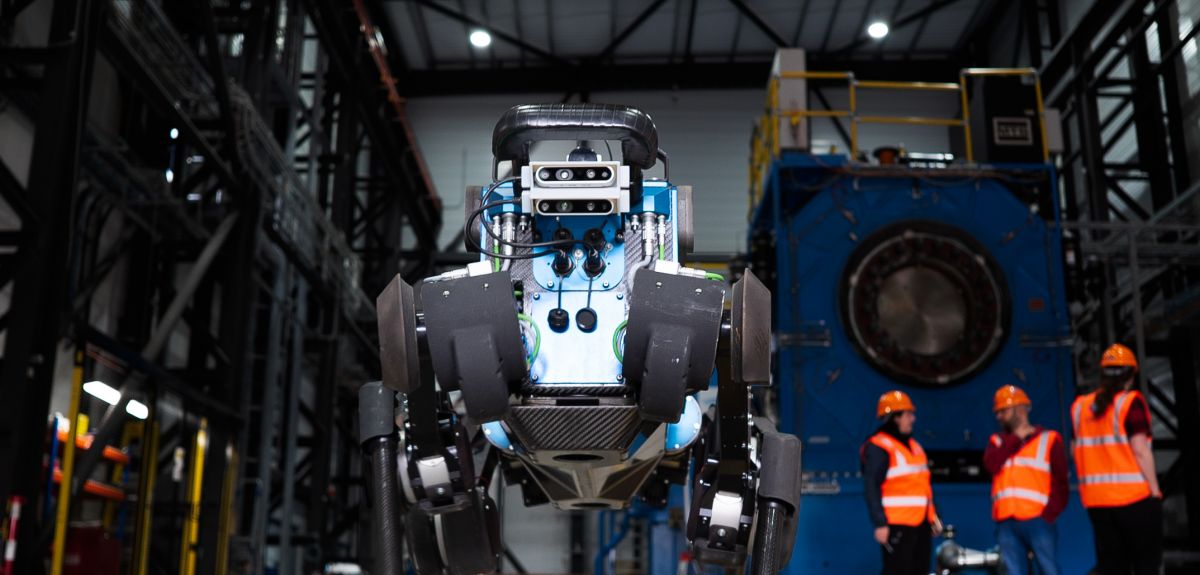
Robotics for a Safer World
University of Oxford’s expertise in developing robots for extreme environments has led to partnerships within two Industrial Strategy Challenge Fund projects, bringing together university and business partners across the UK.
The Oxford Robotics Institute is part of two research hubs, allowing researchers to apply their specialist development of legged robots and task orientated mission planning to two different Industrial sectors.
This has in turn unlocked a further £200,000 UKRI funding bid for a more specific, Oxford-based research project to develop a composite radiation smart sensor.
Background
Robotics for a Safer World is one of the UK's Industrial Strategy Challenge Funds available to UK-based researchers and businesses who are working on collaborative research and development and demonstrator projects. Announced by the UK government in 2017, up to £93 million was allocated to industry and researchers in order to de-risk research and innovation in advanced robotics to create a safer world of work.
Four research hubs were created from a £44.5 million government investment, plus £52 million from industry and commercial partners, awarded in October 2017, running until April 2021.
Through the Oxford Robotics Institute, researchers from University of Oxford are delivering research and expertise within the ORCA and RAIN Hubs.
The Offshore Robotics for Certification of Assets (ORCA) Hub, representing £14.6 million of ISCF funding.
Focused ondeveloping robotics and AI technologies for use in extreme and unpredictable environments.
Led by Heriot-Watt University, bringing together 26 researchers and 30 commercial and industry partners.
The Robotics and Artificial Intelligence for Nuclear (RAIN) Hub, representing £12 million of ISCF funding.
Focused on developing innovative technologies to address the challenges facing the nuclear industry.
Led by University of Manchester, bringing together 27 researchers and 35 commercial and university partners.
Impact on Oxford Robotics Institute
ORI’s involvement has supported up to 8 research posts, including 4 post-doctoral researchers and two technicians.
The team were part of two demonstration days in 2018 and 2019, one in Gloucestershire and one in Newcastle, where industry partners, researchers and funders were present.
The demos provide an opportunity for the robots to perform a range of tasks far away from controlled lab conditions, within mock-up environments – for example an oil rig, complete with fire damaged living compartments, a variety of storage vessels, and treacherous surfaces.
Dr. Maurice Fallon, Departmental Lecturer at the University of Oxford and a Royal Society University Research Fellow, leads the Dynamic Robot Systems Group which researches control, motion planning, mapping and navigation for dynamically moving robots.
He is Oxford’s principal investigator with ORCA and co-investigator with RAIN. Other Oxford investigators on the ORCA and RAIN Hubs include Dr. Ioannis Havoutis and Prof. Nick Hawes.
In discussion about being involved with the Industrial Challenge Fund and the Robotics for a safer world challenge, Maurice identifies what his team’s involvement had on the bid and in turn the benefits for them in being involved.
"We have significant expertise in mobile robotics so we added a capability that was necessary to the ORCA bid whilst benefited from becoming involved with partners connected to the Energy sector.
“It also led us to create a shop window for our research because we held demonstrations that brought industry to a site for a day where we could talk with them.
“Instead of the research sitting with academics, the demonstrators enabled us and industrial partners to engage with one another. It makes a difference from the usual funding application or bid process which is usually a proposal written by academics; this different approach brought academia and industry much closer."
Leveraging Further ISCF Funding
Oxford’s Involvement in the two Hubs has resulted in further company collaboration to leverage follow on ISCF funding.
Oxford Robotics Institute are collaborating with Cumbrian-based imaging technology company Createc to develop a modular Radiation ‘Smart Sensor'.
The Smart Sensor will combine the ability to sense radiation using a special imaging detector, as well as machine learning to advise other system components on how to react to data.
ORI and Createc were awarded £197,500 for the project running from November 2019 to December 2020.
Fallon said: “Being part of a consortium opened the door for us and created pathway for further funding.
“The smart sensor will make it easy for anyone to make their robot respond intelligently in radioactive environments, avoiding hazards and actively managing its own exposure to radiation.”
Funder: Industrial Strategy Challenge Fund